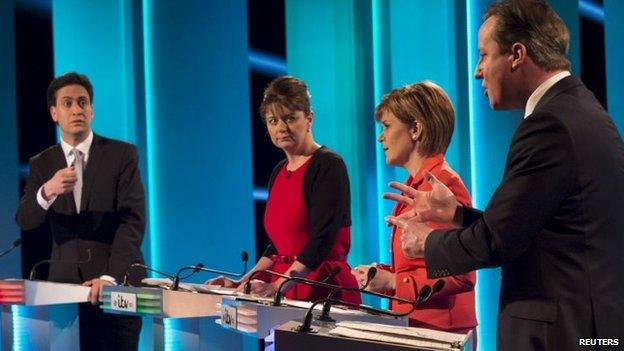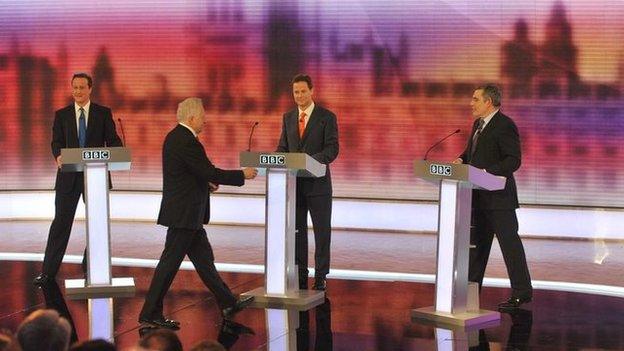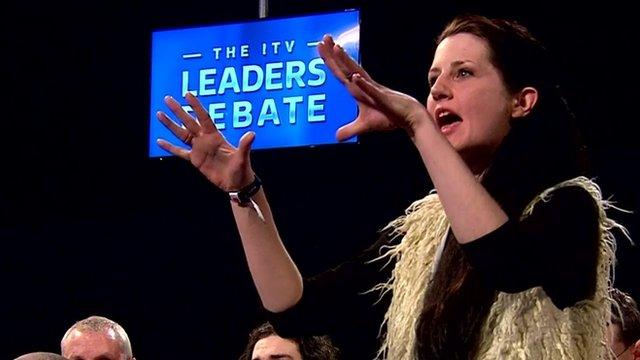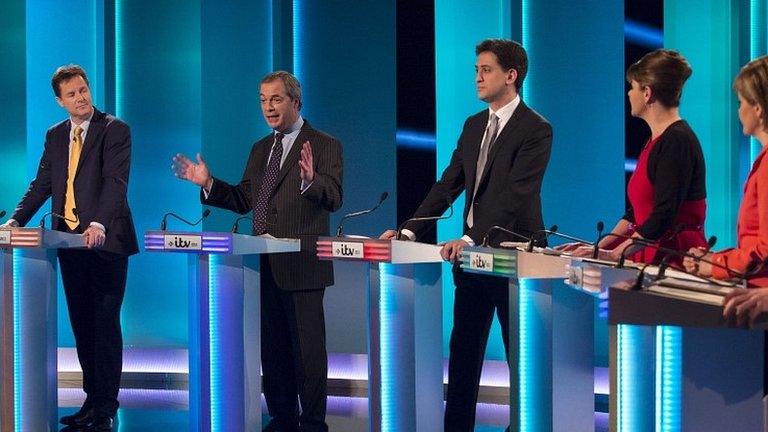Leaders' debate attracts seven million viewers
- Published

The leaders were each given the same amount of time to answer questions
The seven-way party leaders' TV debate drew an average audience of seven million viewers during its two-hour broadcast on ITV on Thursday night.
Starting at 20:00 BST, the live debate attracted a 31% share of the TV audience.
The figures do not include ITV's catch-up channel or the simultaneous broadcast on the BBC News Channel.
Snap polls conducted after the debate offered a blurred picture of which leader came over best.

Did the debate make for riveting viewing?
By Jonathan Holmes, RadioTimes.com
Television viewers wanted a "spectacle", but British politics has never wanted for spectacle. Parliament is opened every year by the Queen - wearing an actual crown - and every week our politicians make spectacles of themselves at PMQs. Instead what viewers got was a debate.
This is a timeslot that usually features soap operas, and the seven-way fight had potential to rival anything on EastEnders or Corrie. There were familiar characters and new faces (for those outside Scotland and Wales), bitter enemies and coalition break-ups and Nigel Farage.
But if anything it was too polite. Usually seven people on an ITV stage means someone is about to throw a chair at Jeremy Kyle. Yet the careful moderation of ITV News's Julie Etchingham meant everything went according to plan. In two hours only four questions were asked, with the first seven minutes of every section allocated to the leaders' uninterrupted responses. For those wanting a brawl, it was a bit dull and overlong. It may have benefitted from more breaks, to let the viewers (and contestants) catch their breath.
In the Spin Room at Salford, where journalists and politicians watched the debate, the biggest laughs went to some pained expressions and Farage being Farage. That's why when a member of the audience started heckling, Twitter lit up, and many journos ran out of the room like Superman looking for a phone booth. At last, some shouting. This was more like it.
Next week: Emmerdale.

The run-up to the debate was mired in its own tensions as Conservative leader David Cameron pushed for the Green Party to be involved in any televised event which also featured UKIP's Nigel Farage.
Eventually the contest featured the Conservative and Labour leaders, as well as the leaders of the Lib Dems, UKIP, the Green Party, the SNP and Plaid Cymru.

The first televised election debates in the UK were in 2010
Last week, Jeremy Paxman separately grilled both Mr Cameron and Labour's Ed Miliband for Channel 4 and Sky News, with three million viewers watching across both channels.
And on 16 April the BBC will play host to five opposition leaders (Labour, Green, SNP, UKIP and Plaid Cymru), with David Dimbleby chairing the debate.
Televised election debates are still a relatively new concept in the UK, with the first ones taking place in 2010.
Those involved a series of three debates featuring Mr Cameron, former Labour leader Gordon Brown and Liberal Democrat leader Nick Clegg. The first went out on ITV and attracted 9.4 million viewers.
- Published3 April 2015

- Published3 April 2015

- Published2 April 2015